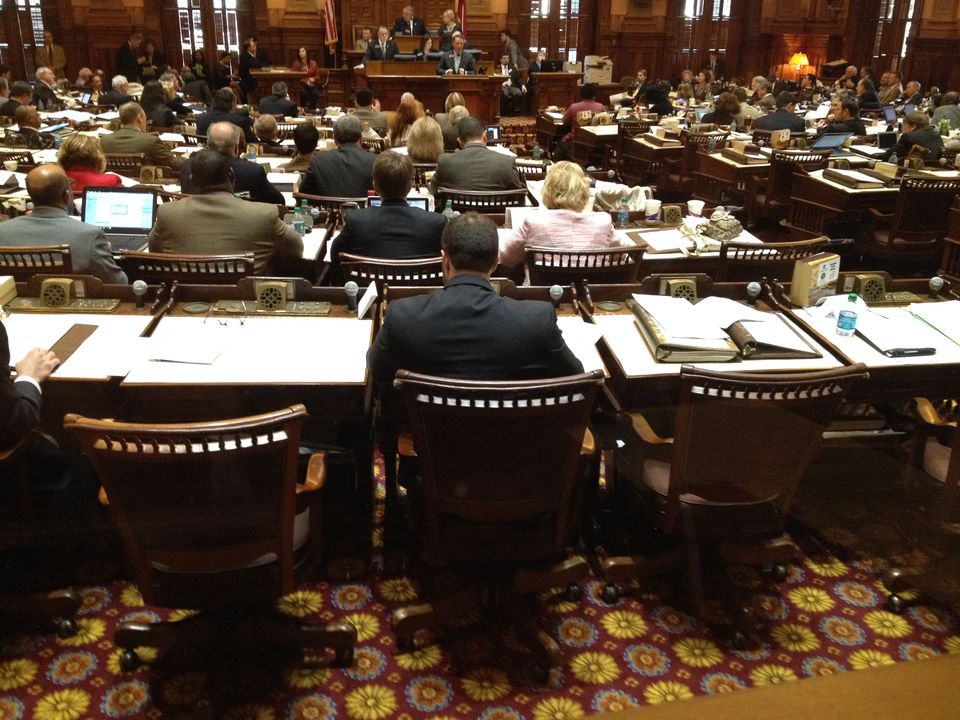By: Max Wallace

Newly elected state Rep. Sam Moore (R-Macedonia) did a couple of things wrong his first week in office. He introduced a slew of new bills, flouting a seniority norm where new legislators normally sit back and take some time to learn the ropes before taking legislation to the floor. He also pushed his bills forward prematurely so that they could make it through committee before legislative day 30, known as Crossover Day. His biggest mistake though, wasn’t the way in which his legislation was introduced, it was the legislation itself. The freshly christened public representative took it upon himself to repeal loitering laws and by extension, make it legal for convicted sex offenders to be near schools, daycares, and community pools.
As could be expected, public reaction to this move was somewhat less than stellar; in fact, supporting a bill like this is the electoral equivalent of lighting yourself on fire and then promptly leaping off of the nearest cliff. In the political firestorm that followed the bill’s introduction, a number of Moore’s colleagues came only slightly short of suggesting that he do just that, with nearly every member of the house turning against him. It would seem that keeping sex offenders away from children can be added to the list of things that Democrats and Republicans agree on. Rep. John Pezold (R-Forston) summed things up nicely when he stated, “If Mr. Moore’s mission was to come down to the state Capitol and alienate his colleagues by staking out positions that no one in their right mind could agree with, he can now hang a ‘Mission Accomplished’ banner behind him because he has done just that.” Rep. Moore himself stated “Am I saying it’s not creepy? It’s definitely creepy.” Eventually realizing that this bill would never even get close to a floor vote, Moore withdrew the legislation on Tuesday. Furthermore, he apologized for his actions, calling them a “rookie mistake” and stating that he thought that only committee members would see the bill.
The purpose of this article however, is not to railroad another Republican for making a terrible judgment call. Rep. Moore’s colleagues and the media have been quite thoroughly executed that task. Instead, this issue should be examined a symptom of a larger problem. This is what happens when you put ideals ahead of common sense. The original intent behind this bill was not to make Georgia a more dangerous place for children; it was to protect citizens’ rights to the Fifth Amendment. Moore, a constitutional conservative thought that it was an unconstitutional infringement on liberty for police officers to force people to identify themselves. The most effective way to restore this right was to abolish loitering laws, the mechanism by which police officers can force citizens to identify themselves. When he was told that repealing these laws would allow sex offenders to be near children, he decided that constitutional integrity was the higher cause.
This is merely one of a series of political moves by Republicans on the state and national level that has left the public scratching their heads. The legislators who shut down the government and are currently trying to block immigration reform genuinely believe that they are acting in the country’s best interest. These legislators, like Rep. Moore, were elected largely as a reactionary measure to the perceived explosion of liberalism that is Obamacare, but when they made their campaign promises to balance the budget, tighten border controls, and return America to constitutional values, they forgot one thing: in order to make any of this possible, they have to convince the majority of their colleagues to go along with their ideas. The key difference between Rep. Moore and his national counterparts is that, while Rep. Moore pushed legislation for an unrealistic ideal, representatives at the national level are attempting to gridlock Congress until their set of ideals can be realized. Differences notwithstanding, these misguided Republican efforts will continue to end in the same fashion as Sam Moore’s bill and the recent government shutdown. Given enough time, legislators will realize what everyone else already knew about these measures: that they were a bad idea, causing more harm than good because they go nowhere.
Rep. Moore’s biggest mistake wasn’t championing constitutional liberty; it was assuming that the Constitution exists in a vacuum, segregated from social concerns or political realities. He assumed that the bill would speak for itself on the grounds of freedom, but instead, what the public saw was a misguided piece of legislation that endangered that portion of society which they hold most dear. This mistake of pursuing constitutional values at any cost occurs far too often and is one of the major factors which hurt the Republican Party at the polls. What Rep. Moore, and what any constitutional conservative has to realize is that values only matter if they are realistic, and more importantly, achievable. Legislators are mandated to compromise in their job description; it’s the only way anything can be accomplished, short of attaining a supermajority and passing a bill based off of sheer partisan superiority. Alienating your colleagues and ostracizing yourself is not the proper way to go about politics.
The Republican Party, particularly its right wing contingent, can learn something from Sam Moore’s disaster. If it seems like a bad idea, it probably is, even if its intent is to protect the constitution. In a larger sense, the takeaway is that a legislator’s opinion only matters if he can get 50 percent and one of his friends to agree with him, otherwise all he’s doing is talking. These misguided attempts to protect civil liberties don’t just bog down legislatures and make it harder for everyone else to get work done. They create a media spectacle that oftentimes gives the impression that your party is full of nothing but idealists who remain out of touch with the real world. Sam Moore’s intentions were good, but he shouldn’t have brought that bill to the floor. He should have done his job. He should have talked things over with his colleagues, debated and compromised. He should have worked to make Georgia a better place, not just in theory, but in reality.

